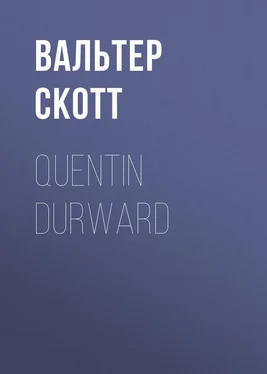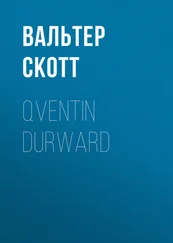Вальтер Скотт - Quentin Durward
Здесь есть возможность читать онлайн «Вальтер Скотт - Quentin Durward» — ознакомительный отрывок электронной книги совершенно бесплатно, а после прочтения отрывка купить полную версию. В некоторых случаях можно слушать аудио, скачать через торрент в формате fb2 и присутствует краткое содержание. Жанр: foreign_antique, foreign_prose, Альтернативная история, на английском языке. Описание произведения, (предисловие) а так же отзывы посетителей доступны на портале библиотеки ЛибКат.
- Название:Quentin Durward
- Автор:
- Жанр:
- Год:неизвестен
- ISBN:нет данных
- Рейтинг книги:3 / 5. Голосов: 1
-
Избранное:Добавить в избранное
- Отзывы:
-
Ваша оценка:
- 60
- 1
- 2
- 3
- 4
- 5
Quentin Durward: краткое содержание, описание и аннотация
Предлагаем к чтению аннотацию, описание, краткое содержание или предисловие (зависит от того, что написал сам автор книги «Quentin Durward»). Если вы не нашли необходимую информацию о книге — напишите в комментариях, мы постараемся отыскать её.
Quentin Durward — читать онлайн ознакомительный отрывок
Ниже представлен текст книги, разбитый по страницам. Система сохранения места последней прочитанной страницы, позволяет с удобством читать онлайн бесплатно книгу «Quentin Durward», без необходимости каждый раз заново искать на чём Вы остановились. Поставьте закладку, и сможете в любой момент перейти на страницу, на которой закончили чтение.
Интервал:
Закладка:
“I am, I fear, doomed to interrupt it, Sire,” said the Comte de Dunois; “the Burgundian Envoy is before the gates of the Castle and demands an audience.”
“Demands an audience, Dunois?” replied the King. “Did you not answer him, as we sent you word by Oliver, that we were not at leisure to see him today, – and that tomorrow was the festival of Saint Martin, which, please Heaven, we would disturb by no earthly thoughts – and that on the succeeding day we were designed for Amboise – but that we would not fail to appoint him as early an audience, when we returned, as our pressing affairs would permit.”
“All this I said,” answered Dunois, “but yet, Sire – ”
“Pasques dieu! man, what is it that thus sticks in thy throat?” said the King. “This Burgundian’s terms must have been hard of digestion.”
“Had not my duty, your Grace’s commands, and his character as an envoy, restrained me,” said Dunois, “he should have tried to digest them himself; for, by our Lady of Orleans, I had more mind to have made him eat his own words, than to have brought them to your Majesty.”
“Body of me,” said the King, “it is strange that thou, one of the most impatient fellows alive, should have so little sympathy with the like infirmity in our blunt and fiery cousin, Charles of Burgundy. Why, man, I mind his blustering messages no more than the towers of this Castle regard the whistling of the northeast wind, which comes from Flanders, as well as this brawling Envoy.”
“Know then, Sire,” replied Dunois, “that the Count of Crevecoeur tarries below, with his retinue of pursuivants and trumpets, and says, that since your Majesty refuses him the audience which his master has instructed him to demand, upon matters of most pressing concern, he will remain there till midnight, and accost your Majesty at whatever hour you are pleased to issue from your Castle, whether for business, exercise, or devotion; and that no consideration, except the use of absolute force, shall compel him to desist from this.”
“He is a fool,” said the King, with much composure. “Does the hot headed Hainaulter think it any penance for a man of sense to remain for twenty-four hours quiet within the walls of his Castle, when he hath the affairs of a kingdom to occupy him? These impatient coxcombs think that all men, like themselves, are miserable, save when in saddle and stirrup. Let the dogs be put up, and well looked to, gentle Dunois. – We will hold council today, instead of hunting.”
“My Liege,” answered Dunois, “you will not thus rid yourself of Crevecoeur; for his master’s instructions are, that if he hath not this audience which he demands, he shall nail his gauntlet to the palisade before the Castle in token of mortal defiance on the part of his master, shall renounce the Duke’s fealty to France, and declare instant war.”
“Ay,” said Louis without any perceptible alteration of voice, but frowning until his piercing dark eyes became almost invisible under his shaggy eyebrows, “is it even so? will our ancient vassal prove so masterful – our dear cousin treat us thus unkindly? – Nay, then, Dunois, we must unfold the Oriflamme, and cry Dennis Montjoye!”
[Montjoie St. Denis, a former war cry of the French soldiers. Saint Denis was a patron saint of France who suffered martyrdom in the third century. Montjoie (mont and joie) may be the name of the hill where the saint met his death; or it may signify that any such place is a “hill of joy.”]
“Marry and amen, and in a most happy hour!” said the martial Dunois; and the guards in the hall, unable to resist the same impulse, stirred each upon his post, so as to produce a low but distinct sound of clashing arms. The King cast his eye proudly round, and, for a moment, thought and looked like his heroic father.
But the excitement of the moment presently gave way to the host of political considerations, which, at that conjuncture, rendered an open breach with Burgundy so peculiarly perilous. Edward IV, a brave and victorious king, who had in his own person fought thirty battles, was now established on the throne of England, was brother to the Duchess of Burgundy, and, it might well be supposed, waited but a rupture between his near connexion and Louis, to carry into France, through the ever open gate of Calais, those arms which had been triumphant in the English civil wars, and to obliterate the recollection of internal dissensions by that most popular of all occupations amongst the English, an invasion of France. To this consideration was added the uncertain faith of the Duke of Bretagne, and other weighty subjects of reflection. So that, after a deep pause, when Louis again spoke, although in the same tone, it was with an altered spirit. “But God forbid,” he said, “that aught less than necessity should make us, the Most Christian’ King, give cause to the effusion of Christian blood, if anything short of dishonour may avert such a calamity. We tender our subjects’ safety dearer than the ruffle which our own dignity may receive from the rude breath of a malapert ambassador, who hath perhaps exceeded the errand with which he was charged. – Admit the Envoy of Burgundy to our presence.”
“Beati pacifici, [blessed are the peace makers]” said the Cardinal Balue.
“True; and your Eminence knoweth that they who humble themselves shall be exalted,” added the King.
The Cardinal spoke an Amen, to which few assented, for even the pale cheek of Orleans kindled with shame, and Balafre suppressed his feelings so little, as to let the butt end of his partisan fall heavily on the floor – a movement of impatience for which he underwent a bitter reproof from the Cardinal, with a lecture on the mode of handling his arms when in presence of the Sovereign. The King himself seemed unusually embarrassed at the silence around him.
“You are pensive, Dunois,” he said. “You disapprove of our giving way to this hot headed Envoy.”
“By no means,”’ said Dunois; “I meddle not with matters beyond my sphere. I was thinking of asking a boon of your Majesty.”
“A boon, Dunois – what is it? You are an unfrequent suitor, and may count on our favour.”
“I would, then, your Majesty would send me to Evreux to regulate the clergy,” said Dunois, with military frankness.
“That were indeed beyond thy sphere,” replied the King, smiling.
“I might order priests as well,” replied the Count, “as my Lord Bishop of Evreux, or my Lord Cardinal, if he likes the title better, can exercise the soldiers of your Majesty’s guard.”
The King smiled again, and more mysteriously, while he whispered Dunois, “The time may come when you and I will regulate the priests together. – But this is for the present a good conceited animal of a Bishop. Ah, Dunois! Rome, Rome puts him and other burdens upon us. – But patience, cousin, and shuffle the cards, till our hand is a stronger one.”
[Dr. Dryasdust here remarks that cards, said to have been invented in a preceding reign, for the amusement of Charles V during the intervals of his mental disorder, seem speedily to have become common among the courtiers… The alleged origin of the invention of cards produced one of the shrewdest replies I have ever heard given in evidence. It was made by the late Dr. Gregory of Edinburgh to a counsel of great eminence at the Scottish bar. The Doctor’s testimony went to prove the insanity of the party whose mental capacity was the point at issue. On a cross interrogation, he admitted that the person in question played admirably at whist. “And do you seriously say, doctor,” said the learned counsel, “that a person having a superior capacity for a game so difficult, and which requires in a preeminent degree, memory, judgment, and combination, can be at the same time deranged in his understanding?” – “I am no card player,” said the doctor, with great address, “but I have read in history that cards were invented for the amusement of an insane king.” The consequences of this reply were decisive. S.]
Читать дальшеИнтервал:
Закладка:
Похожие книги на «Quentin Durward»
Представляем Вашему вниманию похожие книги на «Quentin Durward» списком для выбора. Мы отобрали схожую по названию и смыслу литературу в надежде предоставить читателям больше вариантов отыскать новые, интересные, ещё непрочитанные произведения.
Обсуждение, отзывы о книге «Quentin Durward» и просто собственные мнения читателей. Оставьте ваши комментарии, напишите, что Вы думаете о произведении, его смысле или главных героях. Укажите что конкретно понравилось, а что нет, и почему Вы так считаете.












